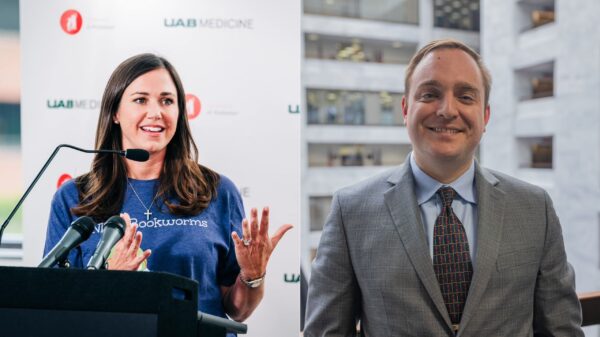The Alabama Department of Corrections has signed a billion-dollar healthcare services contract with a Tennessee company despite questions of a conflict of interest in the bidding process, the company’s numerous issues providing similar care in other states and lawsuits filed in several other states against the company for failing to pay several third-party vendors and hospitals.
The Alabama Legislature’s Contract Review Committee, following intense grilling from Rep. Chris England, D-Tuscaloosa, put a 45-day hold on the contract last Thursday. That followed an earlier agreement between YesCare and ADOC, entered into in July, being pulled and re-bid after it was learned that an attorney representing ADOC in numerous lawsuits had been placed on the company’s board of advisors just weeks before the contract agreement was announced.
An ADOC attorney, at Thursday’s meeting, defended its decision and said a thorough review of the potential conflict found that the attorney, Maynard, Cooper & Gale’s Bill Lunsford, who has been paid tens of millions of dollars to represent ADOC in numerous lawsuits, including a federal lawsuit related directly to ADOC’s problems with healthcare services, didn’t impact the decision or process.
ADOC acting general counsel Mary-Coleman Roberts said a report of “undue influence,” which was received by ADOC after the contract was initially awarded in July 2022, was investigated by ADOC. During questioning by England, Roberts said that written allegations suggesting that “someone” associated with ADOC had held conversations with “one of the potential vendors” about undisclosed details within the request for proposal, potentially giving that vendor an advantage in the bidding process.
Roberts later admitted that one of the vendors – presumably YesCare, since it won the contract – had received “inside information” that the other vendors didn’t receive. That fact led to ADOC pulling its initial agreement with YesCare and restarting the bid process.
At that point, Roberts told England, ADOC made sure to provide all vendors with the same information, including the “inside information” that YesCare received.
“They were given the same information as … we gave that same information to every single vendor the second go-around,” Roberts told the committee.
Roberts also said YesCare disclosed the fact that Lunsford was on its board, but not until after the company had been awarded the contract initially. She also questioned whether Lunsford was ever actually on the board and claimed the position was an “advisory role.”
According to a YesCare company press release, however, Lunsford had been seated as a new advisory board member in June. The press release announcing his appointment, along with two others, said the board members would “provide guidance, input, strategic advice and render recommendations with respect to any matter ….”
England, apparently dismayed by Roberts’ answers, observed: “The attorney who represents us in that litigation where healthcare is at an issue is sitting on the board of a competing bidder, and that company got the bid? It’s almost like if we let this go without doing something, we’re almost complicit.”
Roberts countered that ADOC’s review didn’t find that any “actual undue influence occurred,” but that the appearance of influence forced them to start over.
In response to several questions from APR, an ADOC spokesperson said that “Mr. Lunsford’s involvement with YesCare had absolutely no bearing on this procurement.”
In the same response, ADOC also acknowledged that YesCare did not submit the lowest bid for the contract, but that “after a thorough, months-long evaluation process of the vendors’ technical and cost proposals, it was determined that YesCare presented the best overall value to the State.”
ADOC did not offer a more detailed explanation for why that was the case.
“We respect the Alabama Legislature’s oversight role in reviewing contracts related to important state services like correctional healthcare. We will continue to work to address any questions on the part of committee members, and we look forward to returning to Alabama on April 1 to serve the people of the state,” YesCare CEO Sara Tirschwell’s statement read.
For his part, England is skeptical that YesCare can complete the $1.06 billion, four-year contract with the state, even if it is eventually signed.
“The point has to be made that we know that this deal is going to fail,” England said. “We simply do not have enough money to pay to care for our aging prison population that our pardons and paroles board won’t release.
“This is the perfect marriage between a desperate company that was on the verge of bankruptcy and a desperate state that it’s in need of someone to take on its prison healthcare contract that it can’t possibly pay. It won’t work. Corizon (from which YesCare was spun off) already faced down bankruptcy over these exact same problems in other states.”
YesCare declined to comment past a statement from Tirschwell about the Committee putting a 45-day hold on the contract.
YesCare is now facing down a proposed class action lawsuit in Missouri over its handling of the near-bankruptcy. The allegations contained in that lawsuit describe a complicated mashup of corporate smoke-and-mirrors maneuvering that takes advantage of overly business-friendly laws in Texas, which allow a company to define a divisional split of a company as a “merger.”
Those laws effectively allowed Corizon, which had prison healthcare contracts all over the United States and a growing mountain of debt, to break into two companies, leaving one, Corizon, with most of the problems and debt and the other, CHS TX, with a clean slate and almost all of the employees, contracts and assets. CHS TX also retained all Corizon executives, including new CEO Sara Tirschwell. A few months later, another company controlled by Tirschwell, YesCare, bought CHS TX and began operating under the YesCare name.
And just like that, a new company with a clean slate and a seemingly healthy financial status was re-born, leaving a number of unpaid, unhappy former partners scattered about the country.
In Missouri, for example, a number of third-party healthcare providers that worked with Corizon allege that after the split they were stiffed for millions in payments for services that Corizon had approved through its portal. They continued their work believing they would be paid, but even after Corizon was paid the contracted amount by the state of Missouri, it never paid the vendors, the lawsuit alleges.
Similar lawsuits were filed against Corizon in Michigan, where Blue Cross/Blue Shield filed a multi-million-dollar lawsuit for nonpayment. In Idaho, two separate local hospital systems filed multi-million-dollar lawsuits against Corizon for nonpayment. In Arizona, prisoners sued Corizon after their access to care at a local hospital system was cut off because of the company’s unpaid debts. (The hospital system later attempted to bill the inmates for care.)
When asked if ADOC was concerned whether third-party vendors in Alabama would be hesitant to work with YesCare because of the allegations and financial issues, the ADOC spokesperson responded only, “No.”
Why that wouldn’t be a concern is unclear, though, because the issues that brought about the company split last year haven’t gone away.
A Michigan federal court ruled in November that the unique corporate split didn’t absolve the company of its debts and responsibilities, and added CHS TX to a civil rights lawsuit filed prior to the Corizon restructuring. The ruling stopped short of adding YesCare to the lawsuit, but adding CHS TX effectively puts YesCare on the hook for any damages. (In the ruling, the court also noted that YesCare could have been added to the lawsuit had the plaintiff’s attorneys made the appropriate argument.)
Civil rights lawsuits, filed primarily by incarcerated individuals in prisons where Corizon was contracted to provide healthcare services, were one of the biggest financial burdens on the company. Dozens of lawsuits against Corizon – which, thanks to the federal court’s ruling in Michigan, can now also draw in CHS TX and possibly YesCare – are still working their way through various state and federal courts.
In addition, YesCare has lost more than 20 prison service contracts over the past few years, while picking up just five. The most recent canceled contract came last week, when Bernalillo County, New Mexico, exercised its option to end its contract for its Metropolitan Detention Center with YesCare two years early.
The cancellation occurred after YesCare sent a request to county officials asking for increased payments. In response, Bernalillo officials sent a letter detailing a number of issues.
According to the Albuquerque Journal: “In September, in response to (YesCare’s) request, the deputy county manager sent a letter to YesCare’s senior vice president laying out a number of issues, including that the (jail) went for several months without two medical doctors, a site physician and a medical director as required in its contract and that staff were reporting that the medical records system was ‘unusable to such an extent that it hinders care.’”
The Journal noted that the Bernalillo facility had experienced an unprecedented uptick in prisoner deaths in the previous two years, with 21 people dying at the jail since the beginning of 2020. Three people have died so far this year.
That should be particularly alarming for officials in Alabama, where media reports have confirmed at least 222 prison deaths in 2022.
“You would think that given our department of correction’s track record that we would make sure that a contract of this magnitude – I mean, we’re talking about a billion dollars here – would be handled in a way that left absolutely no questions, was above reproach,” England said. “Instead, it’s the exact opposite. Everything about it raises questions.”














































